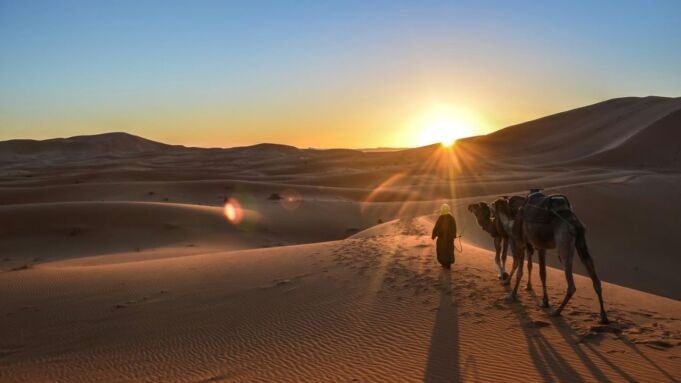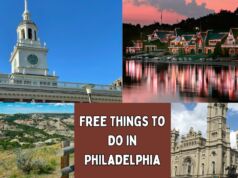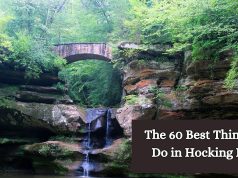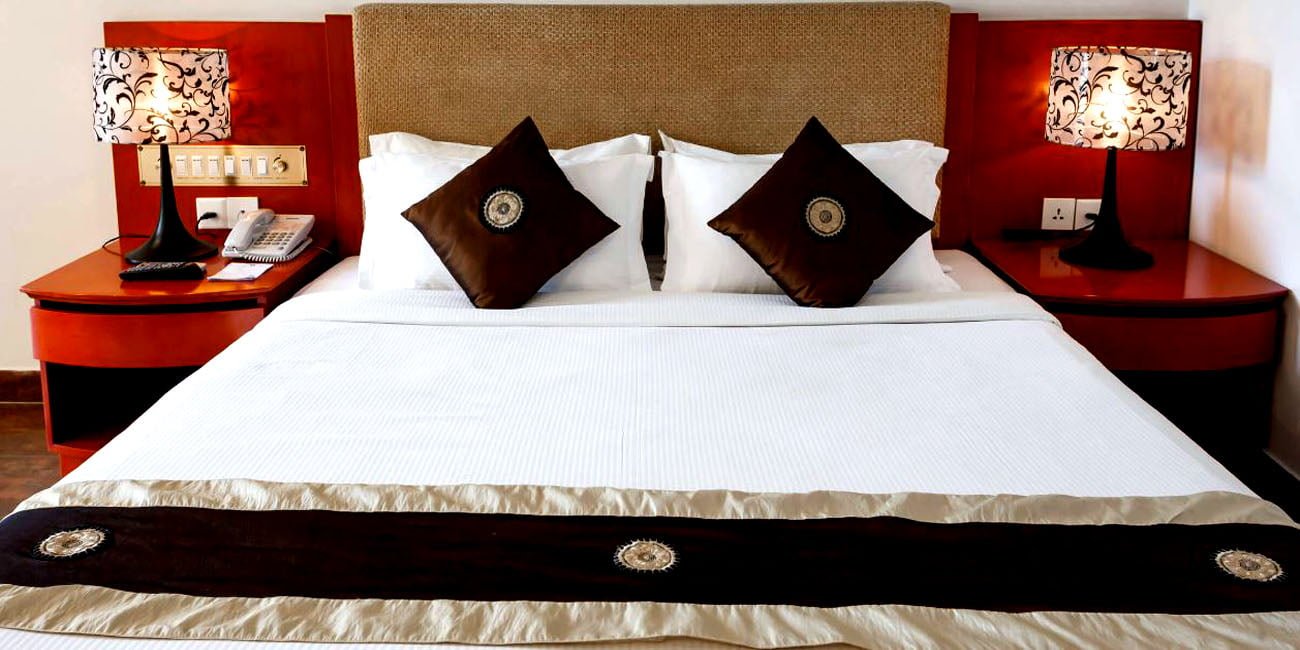Morocco is a country where the sun sets on a tapestry of colors and offers an unforgettable journey through its vibrant culture, ancient history, and breathtaking landscapes.
Nestled at the crossroads of Africa and Europe, Morocco’s charm lies in its diversity — from the majestic Atlas Mountains stretching across the land to the endless dunes of the Sahara Desert and the lively medinas of its historic cities.
Major Cities in Morocco
The vibrant major cities of Morocco, each offer a unique blend of ancient traditions, stunning architecture, and bustling marketplaces.
Marrakech: The Heartbeat of Morocco
Marrakech, known as the Red City for its blush-colored walls, is a sensory overload in the best way possible. The city’s historic medina, a UNESCO World Heritage site, is a labyrinth of souks, spices, and sounds. At its core, the Jemaa el-Fnaa square teems with life, hosting storytellers, musicians, and snake charmers by day and turning into a vast open-air restaurant by night.
Take advantage of the serene beauty of the Majorelle Garden or the grandeur of the Bahia Palace, each telling tales of Morocco’s rich past.
Casablanca: Where Tradition Meets Modernity
Casablanca, immortalized by Hollywood, offers a glimpse into Morocco’s forward-looking yet deeply traditional spirit. The city is home to the breathtaking Hassan II Mosque, standing partly over the ocean. Casablanca’s architectural heritage, from Mauresque buildings to modern skyscrapers, showcases its unique identity, while its marketplaces offer a slice of local life.
Fes: The Soul of Morocco
Fes serves as the cultural and spiritual heart of Morocco. The city’s ancient medina, Fes El Bali, is a step back in time, with its winding alleys, vibrant markets, and the historic Al-Qarawiyyin University — the world’s oldest university. The city’s famous tanneries offer a peek into the traditional methods of leather dyeing that have been passed down through generations.
Tangier: The Gateway Between Worlds
Tangier, perched on the Strait of Gibraltar, has long been a meeting point between cultures. Its medina, Kasbah, and the Caves of Hercules are steeped in history, while its cosmopolitan past has attracted artists and writers from around the world, adding to its eclectic charm.
What to Expect on a Fes to Marrakech Desert Tour?
A desert tour from Fes to Marrakech offers an enchanting journey through the heart of Morocco’s diverse landscapes and rich culture. Travelers can expect a mesmerizing adventure that traverses the Middle Atlas Mountains, revealing quaint Berber villages and lush oases. The highlight is undoubtedly the vast expanse of the Sahara Desert, where a camel trek at sunset leads to a traditional Berber camp for an overnight stay under the stars. The tour also explores the dramatic gorges of Dades and Todra, offering stunning natural beauty.
Along the way, visitors will experience the warmth of Moroccan hospitality, taste local cuisine, and learn about Berber traditions. The journey concludes in the vibrant city of Marrakech, where the ancient medina, bustling souks, and historic landmarks await exploration. This tour is not just a trip but a voyage through time, offering a glimpse into the soul of Morocco.
Natural Wonders in Morocco
Morocco’s landscape is a breathtaking tapestry of natural wonders, from the majestic Atlas Mountains to the serene Sahara Desert and cascading Ouzoud Waterfalls, beckoning adventurers and nature lovers alike.
Atlas Mountains: An Adventurer’s Paradise
The Atlas Mountains offer stunning landscapes and a chance to experience the traditional Berber culture. Trekking routes abound, leading to snow-capped peaks, lush valleys, and remote villages. Mount Toubkal, North Africa’s highest peak, presents a challenging yet rewarding climb.
Sahara Desert: The Sea of Sands
The Sahara Desert’s vast dunes and starlit skies offer an otherworldly experience. Whether you’re riding a camel into the sunset at Erg Chebbi, spending a night under the stars in a desert camp, or exploring ancient kasbahs, the Sahara’s beauty is mesmerizing.
Ouzoud Waterfalls: Morocco’s Natural Oasis
The Ouzoud Waterfalls, amidst the rugged landscape, are a refreshing sight. These cascades are surrounded by green valleys, orchards, and the colorful life of local communities. Visitors can enjoy hikes, boat rides, and the chance to spot local wildlife.
Coastal Retreats in Morocco
Morocco’s enchanting coastal retreats, where golden sands meet the Atlantic and Mediterranean, offer serene beaches, historic charm, and a haven for water sports enthusiasts and sun-seekers alike.
Essaouira: The Windy City of Art
Essaouira offers a laid-back atmosphere with its fortified walls and fishing harbor. Its winds make it a popular spot for wind and kite surfing, while its annual Gnaoua Music Festival celebrates the fusion of African, Berber, and Arabic musical traditions.
Agadir: Sun, Sea, and Sand
Rebuilt after a devastating earthquake, the Agadir tour boasts modern amenities, beautiful beaches, and a vibrant nightlife. The city’s promenade is perfect for evening strolls, while nearby, the serene beaches of Taghazout await surf enthusiasts.
Cultural Experiences for Morocco Destinations
Morocco’s enchanting coastal retreats, where golden beaches meet historic charm. These seaside towns offer serene escapes with their laid-back atmosphere, fresh seafood, and stunning ocean views, perfect for relaxation and adventure.
Moroccan Cuisine: A Feast for the Senses
Moroccan cuisine, with its flavors of saffron, lemon, and olives, offers a culinary journey. Signature dishes like tagine and couscous reflect the country’s rich culinary heritage. Explore local markets or take a cooking class to dive deeper into Morocco’s food culture.
Festivals and Events: Celebrating Moroccan Heritage
Morocco’s calendar is dotted with festivals celebrating everything from music and film to roses and dates. The Marrakech International Film Festival attracts cinema enthusiasts, while the Rose Festival in El Kelaa M’Gouna bathes the town in colors and fragrances.
Tips for Traveling to Morocco Destinations
Traveling to Morocco offers a unique blend of cultural, historical, and natural experiences. To make the most of your trip to this vibrant North African country, consider these tips:
1. Learn Basic Arabic or French Phrases
While many Moroccans speak English, especially in tourist areas, knowing basic phrases in Arabic or French can enhance your interactions with locals and show respect for the country’s culture.
2. Dress Conservatively
Morocco has a predominantly Muslim culture, so dressing modestly is recommended. This is particularly important when visiting mosques, traditional neighborhoods, and rural areas. For women, this means covering shoulders and knees, while men should avoid wearing sleeveless shirts.
3. Embrace the Art of Bargaining
Bargaining is a part of everyday transactions in Moroccan souks (markets). It’s expected and can be a fun, cultural experience. Start at about half the asking price and negotiate from there. Remember to stay friendly and smile!
4. Be Prepared for Varied Climates
Morocco’s climate can vary drastically from one region to another. The coast offers a Mediterranean climate, the mountains can be cool to cold, and the desert can be extremely hot during the day and cold at night. Pack accordingly, with layers being the best approach.
5. Respect Local Customs and Traditions
Understanding and respecting local customs and traditions are crucial in Morocco. This includes being discreet during the holy month of Ramadan, asking permission before taking photos of people, and being mindful of local prayer times.
6. Stay Hydrated, But Be Cautious with Water
It’s essential to stay hydrated, especially when exploring Morocco’s cities or trekking in the desert. However, stick to bottled water, as tap water may not be safe for tourists’ stomachs.
7. Use Local Transportation Wisely
Morocco has a range of transportation options, from trains and buses to grand taxis. Trains are a comfortable and efficient way to travel between major cities, while grand taxis are a common way to get around both in and between cities. Always agree on the fare before starting your journey.
8. Try the Local Cuisine
Moroccan cuisine is rich and diverse, known for dishes like tagine, couscous, and mint tea. Don’t miss out on the street food and local delicacies. Eating at food stalls and markets can also be a memorable experience — just choose places that are busy and popular among locals.
9. Plan Your Itinerary According to the Season
The best time to visit Morocco generally falls in the spring (March to May) and autumn (September to November) when the weather is more comfortable for exploring. However, planning your visit according to what you want to see and do is essential, as certain areas are best visited at specific times of the year.
Conclusion
Morocco’s mosaic of experiences makes it a destination that caters to all tastes — whether you’re seeking adventure, relaxation, or cultural immersion. Each city, from the bustling streets of Marrakech to the tranquil shores of Agadir, tells its own story, inviting travelers to write their own. So, pack your bags and set off on a journey to discover the magic of Morocco.





![12 Interesting Facts About Nicaragua [Fascinating Discoveries] Interesting Facts About Nicaragua](https://tourinplanet.com/wp-content/uploads/2024/07/Interesting-Facts-About-Nicaragua-238x178.jpg)
![Best 20 Things to Do in Downtown Dallas [With Travel Tips] Things to Do in Downtown Dallas](https://tourinplanet.com/wp-content/uploads/2023/12/Things-to-Do-in-Downtown-Dallas-238x178.jpg)



![What Does Aviates Stand for in Aviation? [The Art of Flying] Aviates](https://tourinplanet.com/wp-content/uploads/2024/07/Aviates-100x75.jpg)














![25 Best Peruvian Foods You Must Try In Peru [With Recipes] Peruvian Food](https://tourinplanet.com/wp-content/uploads/2024/07/Peruvian-Food-100x75.jpg)


